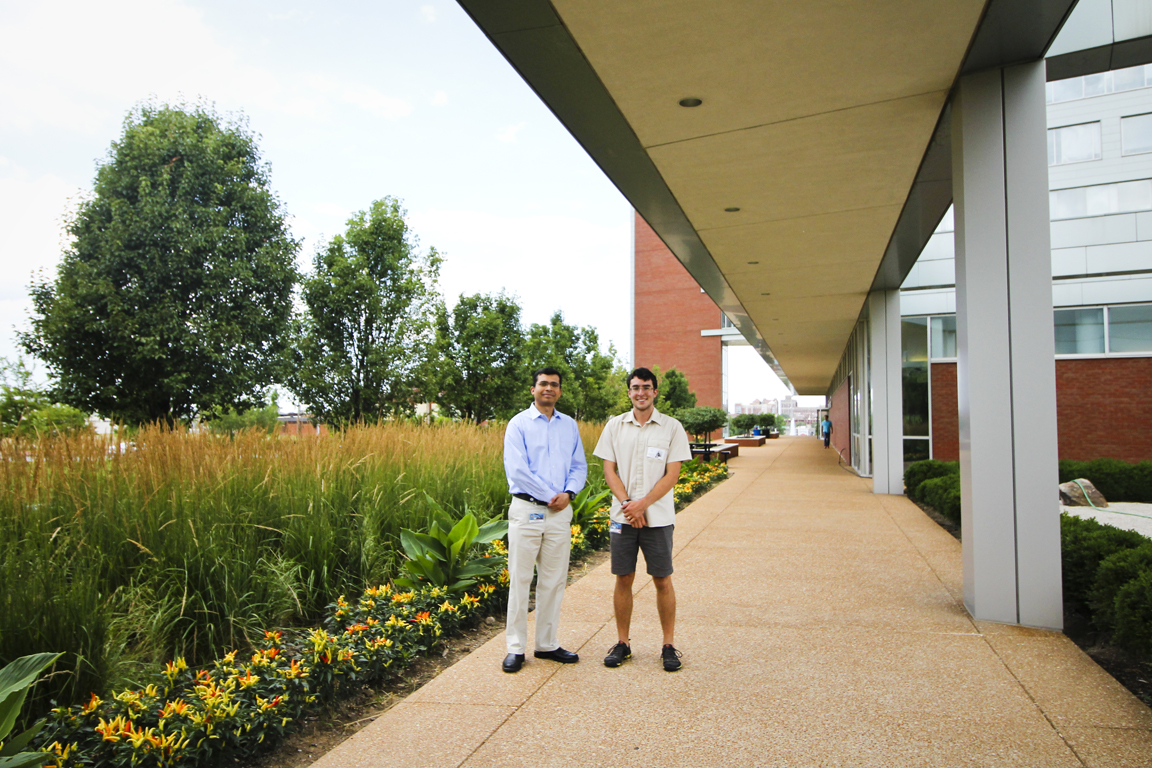SLU Med Student Receives Grant to Study HIV and TB
First-year medical student Michael Scolarici received a 2016 HIV Medical Association (HIVMA) Medical Student Award, a grant that will support an HIV research project for up to three years. Scolarici will work with mentor Soumya Chatterjee, M.D., assistant professor of infectious diseases at SLU, to conduct research that will improve the lives of patients with HIV.
HIVMA announced the selection of 16 medical students from across the U.S. and Canada who will receive funding for clinical learning and research projects through the HIVMA Medical Student Program.
The students will receive mentorship from HIVMA members at their institutions, free membership to HIVMA and the Infectious Diseases Society of America and a stipend of $3,500 per year for up to three years.
“With the support from the HIVMA, I hope to ask and answer interesting questions that lead to improvements in the care of people with HIV. I am also excited to use this as an opportunity to explore a future career in infectious disease research,” said Scolarici.
Scolarici will focus his work on a risk assessment tool that weighs variables which may lead to developing active tuberculosis (TB) in HIV patients who also have latent or dormant TB infection.
“This recognition from HIVMA will provide inspiration and support for a student like Michael who has shown such commitment to research in infectious diseases so early in his career,” said Chatterjee.
The complete list of selected institutions, students, project titles and mentors are as follows:
- Rustin Zomorodi, Increasing PrEP Uptake in High-Risk MSM through Community- and Provider-Focused Interventions. Mentor: Ann Avery, M.D.
- Jesús Luévano, Impact of HIV-Associated Changes in the Gut Microbiome on Disease Progression. Mentor: Douglas S. Kwon, M.D., Ph.D.
- Hazar Khidir, HIV Risk and Harm Reduction in the Periconception Period for Serodiscordant Couples in Durban, South Africa . Mentor: Lynn Matthews, M.D., MPH
- Sunaina Kapoor, Development and Implementation of an Interactive Decision Support Tool for Anti-retroviral Therapy Selection (ART) in HIV Patients. Mentor: Maunank Shah, M.D., Ph.D.
- Maya Koretzky, Bedside Ethics, Provider Burnout, and Subsequent Career Trajectories: An Oral History of Interns and Residents at HIV Centers at the Height of the American Epidemic (1982-1986). Mentor: Robert Siliciano, M.D., Ph.D.
- Michael Scolarici, Use of a Validated Risk Assessment Tool to Assess Additional Variables in the Risk of Progression to Active TB in Patients with HIV and Latent TB Infection. Mentor: Soumya Chatterjee, M.D.
- Clara Van Ommen, Exploring the Triad of Telomeres, HIV and Ovarian Aging. Mentor: Melanie Murray, M.D., Ph.D.
- Gregory Damhorst, Calculation of Community Viral Load as an Indicator for HIV Programs in Champaign County Illinois. Mentor: Janet A. Jokela, M.D., MPH
- Nishant Munugala, The Impact of Health Numeracy on Attitudes toward PrEP for HIV Prevention. Mentor: Susanne Doblecki-Lewis, M.D.
- Andrew Flynn, Determinants of HIV Prevalence Changes in Uganda 2004-2011. Mentor: David Boulware, M.D., MPH, CTropMed.
- Sarah Rutstein, Cost-effectiveness of Treating Depression to Improve HIV Care Outcomes in Malawi. Mentor: Mina C. Hosseinipour, M.D., MPH
- Bryna Harrington, Perinatal Depression, Retention in HIV Care, and Viral Load Suppression among Malawian Women Enrolled in Option B+. Mentor: Mina C. Hosseinipour, M.D., MPH
- Yanni Chang, Focus Groups to Analyze Acceptability of HIV Pre-Exposure Prophylaxis and Self-Testing among Female Sex Workers in Pune, India. Mentor: Ann Duerr, M.D., Ph.D., MPH
- Vanessa Kung, Leveraging HIV Surveillance Data to Inform PrEP Implementation among Young, Black Men who Have Sex with Men. Mentor: Ryan Westergaard, M.D., Ph.D., MPH
- Carlos Rodriguez-Russo, The Impact of Enrollment in Targeted Medicaid Home and Community-Based Services on Hospitalization and Institutional Care Use among Aging HIV+ Patients. Mentor: Ira Wilson, M.D., MSc
- Colleen Walsh Lang, Children Living with HIV/AIDS in Uganda: Managing Biomedical and Social Consequences. Mentor: Bradley Stoner, M.D., Ph.D., FIDSA
“We’re proud to support the work of these students whose commitment to improved care
and understanding of HIV will be critical to continuing progress in controlling the
impacts of the epidemic and helping patients live long and healthy lives,” said HIVMA
Chair Carlos Del Rio, M.D. “These medical students represent the future of the HIV/Infectious
Diseases workforce, and we are excited by the talents and enthusiasm they bring to
the field of HIV/Infectious Diseases.”
The HIVMA Medical Student Program is supported by independent grants from ViiV Healthcare and the Gilead Foundation. The HIV Medicine Association is an organization of medical professionals who practice HIV medicine. They aim to represent the interests of patients by promoting quality in HIV care and by advocating for policies that ensure a comprehensive and humane response to the AIDS pandemic informed by science and social justice.
Established in 1836, Saint Louis University School of Medicine has the distinction of awarding the first medical degree west of the Mississippi River. The school educates physicians and biomedical scientists, conducts medical research, and provides health care on a local, national and international level. Research at the school seeks new cures and treatments in five key areas: cancer, liver disease, heart/lung disease, aging and brain disease, and infectious diseases.
